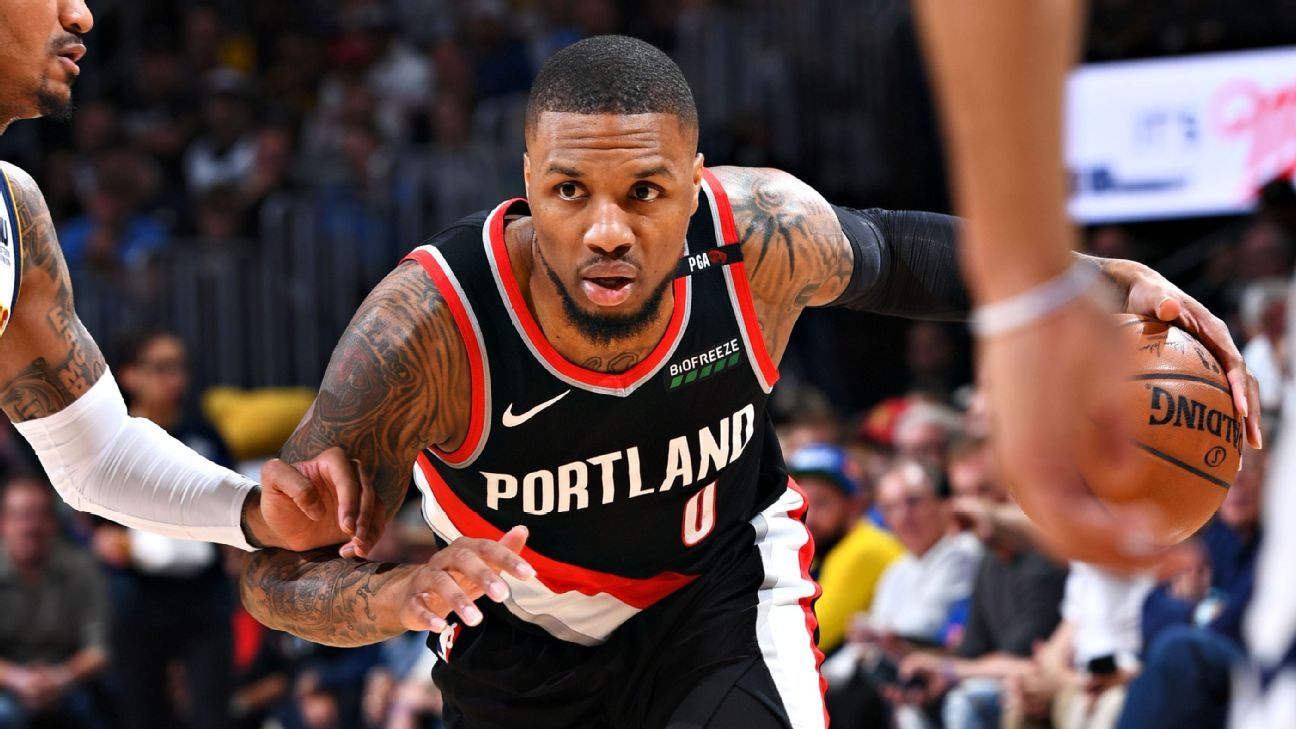
DENVER -- It was a source of pride for Damian Lillard and the Portland Trail Blazers the way they held their composure with the officials in a heated series against the Oklahoma City Thunder.
In some ways, they believe that's why they won the series. They kept their cool. They maintained their focus and concentrated on themselves and no one else.
In Monday's 121-113 Game 1 loss to the Denver Nuggets, Lillard conceded that the Blazers might have gotten distracted at times.
"I think it was a little bit more of that, probably more than we needed," he said. "Maybe we needed to not say as much. Any time you see guys wanting it that bad, you're going to say stuff sometimes, but we might've had a little too much of that tonight."
Lillard was more animated and agitated with the officials in this game than he was at any point in the previous series, showing frustration after not getting calls driving to the rim. The Blazers also were visibly frustrated with some of the calls that went Nikola Jokic's way as he scored 37 points, including going 12-of-12 from the free throw line.
After Game 4 against the Thunder, Lillard said he told his team not to talk to anyone unless they were wearing black and gray jerseys, and the Blazers held true to that through Game 5.
Officiating has been under intense scrutiny this postseason, boiling over in Game 1 of the Western Conference semifinal series between the Houston Rockets and Golden State Warriors that had both teams upset after Golden State's win. Chris Paul was ejected with four seconds left. Game officials have ejected 12 players from games this postseason, equaling a record set in 1994 and 2003. The playoffs have averaged 6.3 ejections in 28 seasons since ejections were first tracked in the 1991-92 postseason. There were only three ejections in last year's playoffs.
"It was a little bit of a heated game when it came to the whistle for us. We'd say something when something needed to be said," Lillard said. "Nobody got a tech, so it wasn't anything disrespectful. But when your season is on the line, you've got to be willing to challenge what's happening out there and try to put your team in the best position to win."
Lillard led the Blazers with 39 points, and for a minute, it felt like a "Dame Time" moment was on its way. One possession after he hit a straightaway 3 to cut the Nuggets' lead to nine with 2:23 left, Lillard rolled off a high screen some 30 feet from the basket and was clear to launch another. Everyone in the building felt it; it was about to be a two-possession game with two minutes to go, and Lillard was ticking.
Instead, Gary Harris stopped the clock, chasing down Lillard's 3 and blocking it from behind. Two more Jokic free throws 20 seconds later, and the Nuggets had Game 1 in hand.
It didn't help Lillard's frustration with the amount of attention the Nuggets gave him basically anytime he had the ball. They made it a priority to try to get the ball out of his hands, trapping and blitzing him on pick-and-rolls.
"I think it was more similar than I thought [it would be]," Lillard said of Denver's defensive approach compared to OKC's.
The Nuggets picked Lillard up full-court at almost all times, using multiple defenders -- Malik Beasley, Torrey Craig and Harris -- to hound him. Lillard finished with six turnovers, and the Blazers had 18 as a team -- two areas they thought were significant factors in their losing Game 1.
"That was a huge part of it. I know I had six myself," Lillard said. "As much as I have the ball, I'm responsible for valuing possessions. On the road, against a team that plays much faster, much better at home, especially when they get out in transition and shoot 3s and get the ball moving, just gave them too many opportunities. Twenty-three points off turnovers, that's always going to hurt you."















 Phone: (800) 737. 6040
Phone: (800) 737. 6040 Fax: (800) 825 5558
Fax: (800) 825 5558 Website:
Website:  Email:
Email: 






